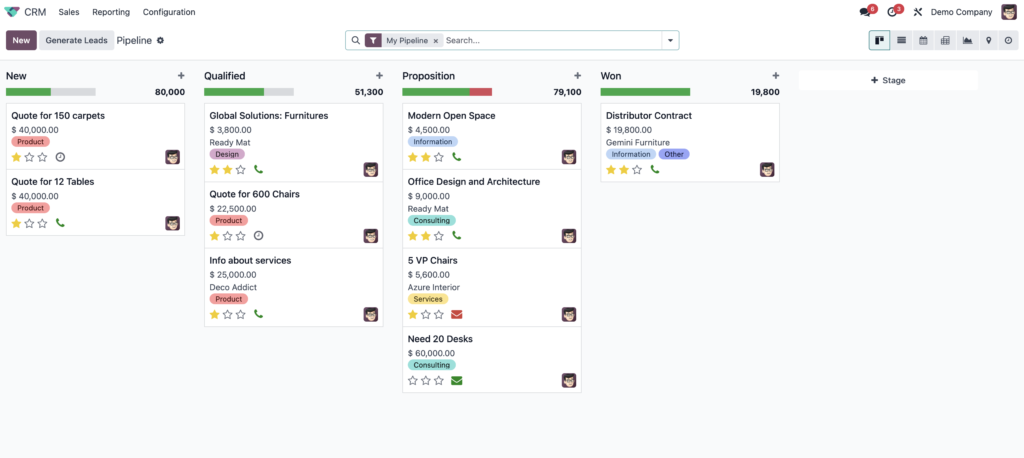![]()

In today’s competitive landscape, a company’s ability to effectively manage its prospects and customers is crucial to its success. Customer Relationship Management (CRM) goes beyond just storing contact information; it encompasses a comprehensive strategy to attract, retain, and maximize customer value. In this article, we will explore the various features of Enterprise Resource Planning (ERP) systems that enable optimal management of prospects and customers.
At the heart of prospect and customer management lies the idea of understanding and proactively responding to customer needs. This includes everything from lead capture to converting them into loyal customers and every step in between. A robust ERP system provides tools to streamline and automate these processes, ensuring superior customer experience and efficient relationship management.
Managing prospects is the first step towards building a lasting relationship with customers. It starts with identifying potential customers and understanding their needs and preferences. This is followed by a series of strategic interactions aimed at converting them into paying customers. An effective approach to prospect management can significantly increase conversion rates and, consequently, revenue.
On the other hand, customer management involves maintaining and strengthening relationships with existing customers. This includes managing customer information, tracking interactions, and personalizing services. An efficient ERP system provides a 360-degree view of the customer, offering deep insights into their needs and behaviors.
In the following sections, we will explore in detail the key features of ERP systems that facilitate effective management of prospects and customers. From lead capture to the analysis of customer interactions, each aspect plays a vital role in improving business performance.
The Importance of Prospect Management in CRM
Prospect management, a crucial aspect of Customer Relationship Management (CRM), plays a fundamental role in a company’s business success. A prospect, or lead, is a person or company that has shown interest in the products or services offered by a company. Identifying and effectively managing these prospects is the first step towards converting this interest into concrete sales.
Identifying and Capturing Prospects
The capture of prospects is a process that begins long before the first direct contact. Through various marketing strategies and communication channels, companies attract potential prospects. Modern ERP systems, integrating CRM tools, enable the systematic capture of these leads. They collect essential information such as contact details, product interests, and even online interaction behaviors. This data collection is the first step towards establishing targeted and personalized communication with prospects.
Prospect Qualification
Once leads are captured, it is crucial to qualify them to ensure they match the ideal customer profile. Prospect qualification involves evaluating their potential to become paying customers. Modern ERP and CRM systems provide tools to analyze prospect data, such as their level of engagement, purchasing capacity, and alignment with the product or service offered. This step ensures that sales resources are focused on the most promising prospects.
Nurturing Prospects
Nurturing, or prospect nurturing, is an essential step in transforming initial interest into deeper engagement. It is an ongoing process of interaction with prospects through various channels, providing relevant information and solutions tailored to their needs. ERP systems, by integrating automated marketing features, enable companies to conduct targeted and effective nurturing campaigns. By providing content tailored to each stage of the prospect’s buying journey, the chances of conversion into a customer are maximized.
Effective prospect management is a fundamental pillar of a successful CRM strategy. It goes beyond collecting and analyzing information; it also involves creating a personalized and engaging experience for each prospect. In the following sections, we will explore other key aspects of customer and prospect management within ERP systems.

Customer Information Management
Effective customer information management is a cornerstone of ERP and CRM systems. It not only allows for the storage and access of customer data but also uses it to build stronger and more profitable relationships.
Centralization of Customer Data
A crucial aspect of customer information management is the centralization of data. Modern ERP systems provide a unified platform where all customer-related information is stored and accessible. This data can include basic information such as names, addresses, product preferences, purchase history, past interactions, and more. This centralization facilitates a comprehensive view of the customer, allowing sales and marketing teams to better understand and address customer needs.
Data Update and Access
Regularly updating customer information is essential to maintain data accuracy. ERP systems facilitate this process by allowing easy and real-time updating of customer data. Additionally, these systems often offer mobile or remote access features, allowing teams to stay connected to customer data no matter where they are. This accessibility enhances responsiveness and the personalization of customer service.
Data-Driven Personalization
Utilizing customer data for personalization is another important facet. ERP systems allow for customer segmentation based on various criteria, such as purchasing behavior or personal preferences. This segmentation helps create personalized offers and targeted marketing campaigns, thereby increasing the effectiveness of sales and marketing efforts.
Data Security and Confidentiality
Finally, the security and confidentiality of customer information are paramount. Modern ERP systems integrate advanced security features to protect data from unauthorized access and breaches. Respecting customer confidentiality is not only a matter of regulatory compliance but also a key element in gaining and maintaining customer trust.
In summary, customer information management in an ERP system is a complex and multidimensional process. It goes beyond data collection and storage, encompassing strategic use of data to enhance customer engagement and optimize business outcomes. The next section will focus on tracking and analyzing customer interactions, another crucial element of customer management within an ERP.
Tracking and Analysis of Customer Interactions
Tracking and analyzing customer interactions are essential components of ERP and CRM systems. This approach allows companies to gain in-depth insights into their customers’ needs and behaviors, leading to better decision-making and strengthened customer relationships.
Interaction Tracking Tools
Modern ERP systems offer a range of tools to record and track all forms of customer interactions, whether it’s emails, phone calls, meetings, or social media communications. These tools enable companies to document every point of contact, creating a comprehensive history of interactions with each customer. This documentation helps provide consistent and personalized service, ensuring that all interactions are taken into account in customer relationship management.
Analysis of Interaction Data
Analysis of interaction data plays a crucial role in understanding customers. By examining trends and patterns in interactions, companies can identify customer needs and preferences, as well as areas that require improvement in service or product offerings. ERP systems integrate analytical tools that turn this data into actionable insights, allowing companies to further personalize their sales and marketing approaches.
Enhancing the Customer Experience
Using interaction data to enhance the customer experience is another key advantage. By understanding how customers interact with the company, it’s possible to optimize customer service, sales, and marketing processes to better meet their expectations. This may include personalized communications, improved service quality, or adjustments to marketing strategies based on customer preferences.
Feedback and Continuous Adaptation
Finally, tracking and analyzing customer interactions enable continuous adaptation of business strategies. By regularly gathering customer feedback and monitoring the effectiveness of different approaches, companies can quickly adjust their tactics to better meet changing market and customer needs.
This section has highlighted the importance of tracking and analyzing customer interactions in ERP systems. By understanding and better responding to customer needs, companies can not only improve customer satisfaction but also increase profitability. The next section will address automation in prospect and customer management, another essential aspect for maximizing efficiency in customer relationship management.
Automation in Prospect and Customer Management
Automation plays a crucial role in modernizing prospect and customer management processes within ERP systems. It enables companies to streamline their sales and marketing efforts, increase efficiency, and provide superior customer service.
Streamlining Sales Processes
Automation of sales processes is one of the most significant applications in ERP systems. It can take various forms, such as automating follow-up emails, scheduling reminders for customer contacts, and automating administrative tasks. This automation reduces the manual workload of sales teams, allowing them to focus on higher-value tasks such as negotiation and closing sales.
Automated Marketing
Automated marketing is another key feature of ERP systems. It enables the creation and management of data-driven, targeted marketing campaigns. For example, personalized emails can be automatically sent to prospects based on their behavior or previous interactions with the company. This personalized approach increases the chances of converting leads into customers.
Enhancing Customer Experience
Automation also contributes to enhancing the customer experience. By automating tasks such as responding to customer inquiries and order management, companies can provide faster and more accurate responses. This increases customer satisfaction and strengthens brand loyalty.
Automated Analysis and Reporting
Finally, modern ERP systems offer automated analysis and reporting tools. These tools gather data on sales, marketing, and customer service and generate detailed reports. These reports provide valuable insights into the performance of different strategies and campaigns, allowing companies to continuously adjust and optimize their approaches.
Automation in prospect and customer management is a fundamental element for increasing efficiency and competitiveness in today’s digital world. It not only improves efficiency but also enhances customer engagement and satisfaction. The next section will address integration with other ERP modules, a crucial aspect for comprehensive customer relationship management.

Integration with Other ERP Modules
Integrating prospect and customer management functionalities with other modules of an ERP system is essential for effective and cohesive business management. This integration promotes a holistic approach, where all business functions are connected and work in synchronization.
Comprehensive Overview of Business Operations
Integrating CRM modules with other aspects of ERP, such as inventory management, accounting, and human resources, provides a complete view of business operations. This 360-degree perspective allows companies to understand how customer interactions impact other areas of the business, such as logistics and billing. Such integration ensures that all business decisions are made with the full scope of business operations in mind.
Consistent Workflow
Another major advantage of ERP integration is the creation of consistent workflows across different departments. For example, customer information gathered by the sales team can be used by the marketing team for targeted campaigns and by the accounting department for accurate billing. This consistency reduces errors and duplicates, improving operational efficiency.
Improved Internal Collaboration and Communication
ERP integration also facilitates better collaboration and communication among different departments. With shared access to customer and prospect information, teams can work together more efficiently to meet customer needs. This leads to improved coordination and faster, more informed decision-making within the company.
Increased Responsiveness and Flexibility
Finally, ERP integration enhances the company’s responsiveness and flexibility in response to market changes. With interconnected systems, businesses can quickly adjust their strategies and processes based on new market information and trends.
Integration with other ERP modules is therefore a crucial element for effective prospect and customer management. It not only enables a better understanding and management of customer relationships but also optimizes overall business operations. The next section will conclude this article by summarizing the key points discussed and providing a call to action for readers interested in ERP solutions.
Conclusion
In conclusion, prospect and customer management is a vital aspect of a company’s business strategy. As we have seen, ERP systems offer an extensive range of features to optimize this management, from capturing and qualifying prospects to analyzing customer interactions, and automating sales and marketing processes.
Recap of Key Points
We have explored how ERP systems enable more efficient prospect and customer management by centralizing data, automating processes, and integrating various business functions. This holistic approach not only improves operational efficiency but also strengthens customer relationships, which are essential for long-term growth and success.
The Importance of an Integrated ERP System
An integrated ERP system is an invaluable asset for any company looking to enhance its customer interactions and optimize its business operations. The ability to have a comprehensive view of prospects and customers, coupled with seamless integration with other business functions, provides a powerful platform for decision-making and business strategy.
If you want to learn more about how an ERP system can transform your prospect and customer management or if you need a customized solution for your business, contact AppSolutions today. Our experts are ready to assist you in selecting and integrating the ERP solution that best meets your specific needs, allowing you to fully leverage all the features and benefits that a modern ERP system can offer.